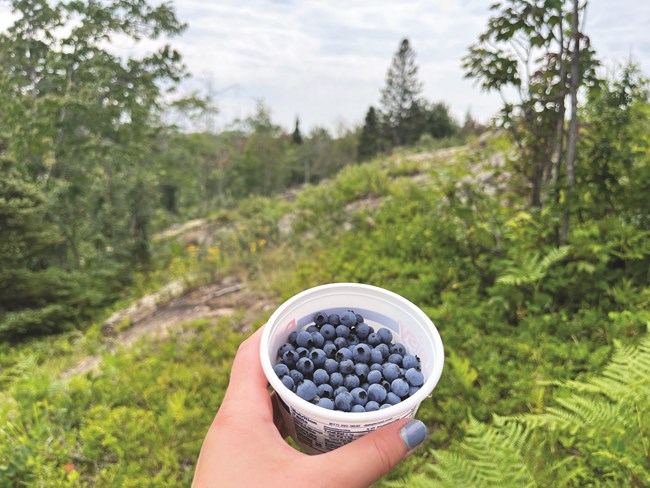Last updated: March 12, 2024
Article
Blueberries, I Love Blueberries!

Bridget Byrne
In Isle Royale’s wilderness, the patches are plentiful. When I’m out picking (and eating), I often wonder about others who picked in the same place. Did Laura Edisen, or another fisherwoman, find blueberries here in the 1930s? It’s likely this particular patch has been scouted for centuries – this island wilderness has witnessed human presence for at least 8,000 years, possibly longer.
There were so many different reasons to make the voyage to Isle Royale: copper mining, fishing, maple sugaring, hunting, and trapping. It’s clear the island has been changed by our presence - feed for horses brought alfalfa, miners and Civilian Conservation Corps (CCC) members left apple trees. At many historic commercial fishing camps, like Wright Island, carefully tended rose bushes still bloom each summer.
Over the years, a lot of reasons to visit Isle Royale have changed – humans are no longer mining copper from the island’s wilderness. Some reasons to visit have stayed the same – many are still taking advantage of Lake Superior’s fishery, and tradition lives on through the Grand Portage Band of Ojibwe’s connection to Minong. Yet, it’s relatively recent that spending time in a national park wilderness can be added to the list of reasons to visit Isle Royale - in 1976, nearly 99 percent of the park’s land area was federally designated as wilderness, which 20,000 visitors enjoy every year.
Regardless of the specific reason for your visit, what’s evident is the allure of Isle Royale’s wilderness has been calling to people for centuries, and it will continue to call to us for a long time to come. Humans have been, and always will be, tightly woven into the wild of Isle Royale.
Liz Valencia
Interpretation and Cultural Resources Manager, Isle Royale National Park
